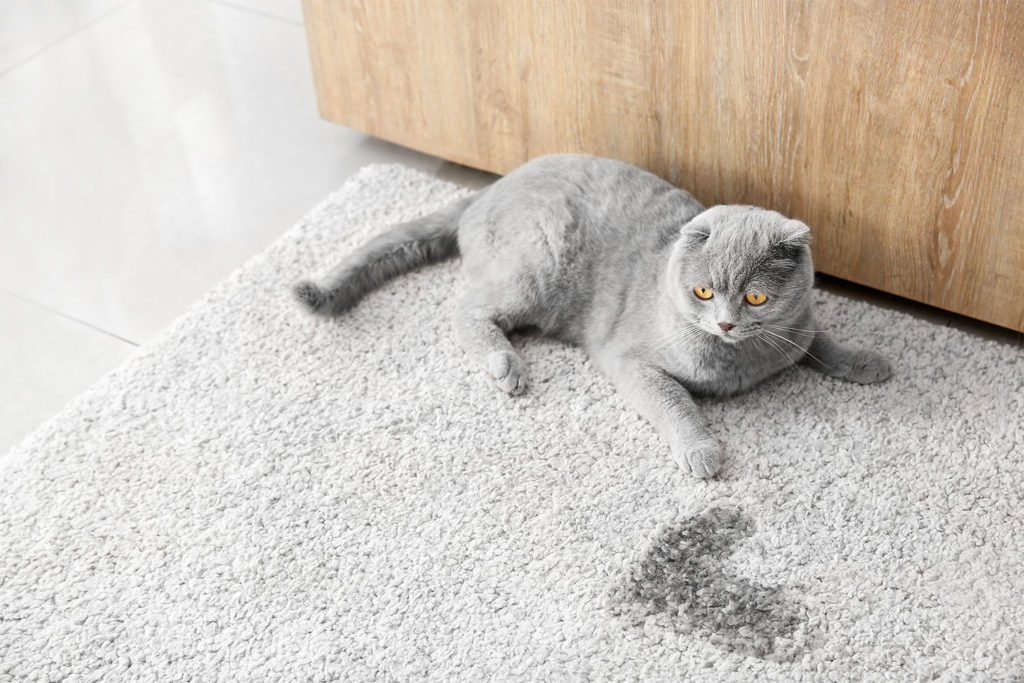Cats can sometimes have a bit of a reputation for being unpredictable, but in reality, many of their behaviors make perfect sense when they are put in context. Cats dutifully using their litter boxes is pretty convenient when it comes to clean-up time.
Yet, all of that can all go out the window when they start having accidents. At first, noticing pee outside the litter box can seem completely puzzling. But, oftentimes, with a little consideration, it starts to make a lot more sense.
While it is a possibility that the issue will correct itself, and your cat will begin to use the litter box again on their own without any further assistance from you, this is not always the case. In many situations, your cat will require a bit of help from you, their loving pet parent, to get everything back to normal.
Even if your cat does begin using the litter box again without your assistance, it is still helpful to assess exactly why they stopped using it in the first place. There are a variety of possible explanations for this sudden change in behavior. Some of these explanations center around your cat’s mental state as well as their physical health, while others are simply a matter of the litter box itself.
By pondering any other ways your cat’s behavior has changed as of late, the reason behind this newest bathroom behavior can become much more apparent. If nothing immediately comes to mind, it’s time to go down our list of potential explanations for these accidents and see if anything fits.
Issues Having To Do With the Litter Box Itself
One of the three main categories (each with their own reasons) a cat may go outside of the litter box is that something about the box is not up to their standards. There are multiple possibilities within this subcategory.
So, even if you think the litter box itself may be to blame, it is still crucial to identify exactly what is causing the issue. Only once you have figured out your cat’s reason for changing their behavior can you take steps to fix it.
The Litter Box Needs To Be Cleaned
This explanation is a simple one, but sometimes the simplest answers are the truest ones. Think about the last time you cleaned your cat’s litter box. Is it at all possible that this chore slipped your mind? Even if you may occasionally forget about the state of the litter box, that does not mean your cat does.
If the litter box is too dirty, your cat may avoid it, leading to accidents on the floor and on furniture. This is never fun for anybody (your cat included), so simply resolve to clean the litter box more often and see if that changes the behavior.
The Litter Box Is Too Small
Clearly, cats can be finicky creatures. If their litter box is too small, that could also be reason enough for them to skip it entirely. This can be fixed by finding a larger litter box that can accommodate their size easily. Consider how big your cat is, and make sure that they will have enough space in the litter box to stand up comfortably.
Cats have been found to greatly prefer litter boxes that measure 86 centimeters (nearly three feet) as opposed to ones that measure 56 cm (nearly two feet). This should give you a good idea of what size cats typically prefer and that your cat may just need a little more space to stretch out. However, all cats are unique; your cat may enjoy another size best — trial and error time.
You Have Recently Switched Over to a New Kind of Litter
Cats are creatures of habit, so it is possible that, even though the box is not an issue, the litter itself is to blame. If you have recently switched your cat over to a new kind of litter and suddenly noticed a change in their bathroom habits, it is fairly safe to assume that they are not a fan. Try switching back to the old litter if possible, and see if that rectifies the issue.
If you are determined to switch to this new kind of litter, first try to combine the old and new kinds to get your cat more acquainted and comfortable with it. Then, gradually add more and more of the new type until your cat is okay with the change.
Emotional Issues That Could Cause Peeing Outside of the Litter Box
Emotional issues are slightly less simple than those having to do with the litter box itself, but there are still ways to fix these problems and get your cat feeling more confident in no time.
Your Cat Is Feeling Stressed Out or Anxious
Again, cats are creatures of habit. For more sensitive cats, something as small as a change in mealtime or litter type could prompt stress resulting in accidents.
For other cats, something like moving houses or bringing in a new pet could prompt this change. Help your cat regain their confidence and calm down by being patient with them and providing them with treats, love, and affection.
In Multi-Cat Households, Cats Can Be Bullied or Intimidated
Households should have one litter box per cat, plus one extra. For single-cat households, this means that your pet will have options. They should never be too far from a box when they need one.
In homes with more than one cat, providing multiple litter boxes prevents the possibility that one cat will be intimidated by the others. This intimidation may make one cat feel unsafe using the litter box.
You Cat Wants To Scent Marking Their Territory
The last emotional reason that we are going to cover for your cat possibly foregoing their litter box is that they are feeling territorial. This could be the case if there is more than one cat in the home or if you have recently moved.
They may be peeing on furniture or on the floor to put their scent down, as they feel insecure. Having an adequate number of litter boxes can help this.
Medical Reasons Your Cat Could Be Peeing Outside of the Litter Box
Finally, we have several medical reasons that could account for your cat’s bathroom accidents. This list is not exhaustive, but it will get you well on your way to discovering the root cause and can help you greatly when speaking with a vet.
Diabetes
One of the main symptoms of feline diabetes that pet parents first notice is a marked increase in thirst and urination. This can lead to your cat needing to pee quite frequently, so they may not always be able to make it to the litter box if it is too far away.
Similarly, since they are peeing so much more often, they may not want to use the box anymore because it needs to be cleaned.
Arthritis
If your cat is experiencing arthritis and the accompanying pain that comes along with it, they might not be using the litter box because entering and exiting it is uncomfortable.
Look at the litter box you are currently providing for your cat. If it requires your cat to jump or maneuver themselves in some way, it might not suit their needs. As cats get older, arthritis becomes more common. Consider a more shallow litter box to help your cat.
A Urinary Tract Infection
A urinary tract infection or UTI is a painful experience for both cats and humans alike. This pain and frequent need to pee can cause many of the litter box behaviors your cat has developed to take the back seat.
Instead, they may just go whenever, wherever. If your cat meows in or around the litter box, this can also indicate to pet parents that there is something wrong.
Thinking Inside the Box
Having accidents outside of the litter box is the primary reason that many cats are surrendered to shelters or returned shortly after being adopted. In fact, 30% of surrendered cats were given up for this reason. This statistic is staggering, but it becomes even more troubling when you consider that lots of the fixes for litter box issues are quite simple.
The situation might seem like a stressful one, and it is certainly unpleasant, but there are plenty of ways to help both you and your cat out when it comes to correct litter box usage.
Know your cat’s behaviors and be ready to make changes to accommodate them if necessary. If you are truly stumped or just have any other questions, reaching out to your cat’s veterinarian or animal behaviorist is always a good idea.
A Vetted Solution
If you have any further questions, concerns, or if you have questions about the state of your cat’s health, do not hesitate to reach out to a qualified veterinarian, like the ones at AskVet.
Litter box accidents happen at any time of the day or night, so with the help of KONG Club, AskVet’s licensed vets are available 24/7. You can also be connected with a community of pet parents who may have dealt with similar issues before and can offer words of encouragement.
Sources:
Litterbox Size Preference in Domestic Cats (Felis catus) | ResearchGate
Effects of Stressors on the Behavior and Physiology of Domestic Cats | National Library of Medicine
Diagnosing Behavior Problems in Cats – Cat Owners | Merck Veterinary Manual
Feline Diabetes | Cornell University College of Veterinary Medicine



